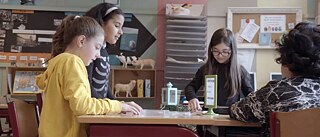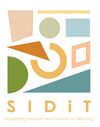The "Supporting Inclusion and Diversity in Teaching" project, part of the European Union's Erasmus+ initiative, promotes integration in the classrooms and brings together the expertise of organisations, institutions, companies and schools from six European countries.
While schools in Europe continue welcoming children from different socio-economic, ethnic, cultural, religious and language backgrounds, their inclusion in the classroom remains a challenge for teachers.
But, how can we discuss inside the classroom with students on issues related to diversity? What tools can we equip teachers with, to deal with the challenges that arise from it?
The Goethe-Institut of Athens has initiated
SIDiT - Supporting Inclusion and Diversity in Teaching -, a transnational project that makes
diversity in the classroom the subject of teaching and thus aims to
support primary school teachers who work in diverse classes.
Through the SIDiT lessons, questions of identity, culture, religion and social justice are addressed.
In addition, new materials are developed:
• A handbook with teaching scenarios to help teachers develop and implement their own activities in the classroom
• An interactive online self-paced course for teachers to practice innovative teaching practices
• Recommendations for educational policy decision-makers on the implementation of SIDiT in schools.
The new teaching methodology enhances both the language skills and the soft skills of students, which are crucial for social inclusion. They also support skills such as learning, critical thinking, media literacy, digital literacy or entrepreneurship.
The basis for the creation of the material are: on one hand, the principles of Universal Design Learning (UDL) and Content and Language Integrated Learning (CLIL) and on the other hand, the two European reference frameworks,
EntreComp and
DigComp.
This is a class that makes you look at yourself and teaches you how other people see things.
I enjoyed getting to know the different cultures and languages in the classroom and seeing that while we are not all the same, we have equal rights.
– Students about SIDiT
IN ACTION
The project started in the midst of the Covid-19 pandemic, which is why many of the activities were inevitably realized online.
Key figures - until 2022:
- The opening conference of the project took place online
- More than 600 students, 18 teachers and 200 student teachers have participated in SIDiT
- 78 % of the students would like to participate again in SIDiT and 70% of the teachers would recommend it to their colleagues
Further information and materials »




